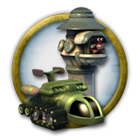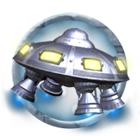 Ik heb in dit blog al aandacht besteed aan de hele Cute versus Science discussie die de laatste tijd op het Amerikaanse Spore forum speelde en had toen al zo een vermoeden dat de hele aanval op Chris Hecker nergens op gebaseerd was, zie ook deze blogberichten.
Ik heb in dit blog al aandacht besteed aan de hele Cute versus Science discussie die de laatste tijd op het Amerikaanse Spore forum speelde en had toen al zo een vermoeden dat de hele aanval op Chris Hecker nergens op gebaseerd was, zie ook deze blogberichten.Will Wright heeft nu in deze post gereageerd en, nadat ook Lucy Bradshaw eerder al had gereageerd, ook weer wat feiten gegeven in plaats van al de onzin die er de laatste tijd online is gekomen:
I’ve just recently tuned into this thread on the forums. I usually try to keep more up to date but I’ve been traveling way too much lately. Wow, there’s some rather intense discussion here I see about the design decisions we made in Spore. I think it’s really important for me to jump in and clarify a few things from my point of view.
First let me say a few things about the “Cute” vs. “Science” perspectives in Spore. It is true that during most of the design process we had team members on different sides of this debate. While I was officially on the science side at the same time I always saw this as a crucial tension that I wanted to foster, in other words I didn’t want the science side to win, I wanted to make sure both sides were represented in the game to some degree.
Two of the Chris’ on our team (Chris Trottier and Chris Hecker) were the most vocal representatives of what I started calling the cute team but they were by no means the only ones, they represented quite a large portion of the team. And their agenda in our design process was most certainly not to dumb-down the gameplay but rather to foster emotional engagement with the players in the game experience. An early example of this was the decision to add eyes to the cell game which in no way changed the gameplay, but we found for certain players made the cell experience more humorous and personal.
I see that many of the criticisms about the depth of play in Spore seem to be personally directed to Chris Hecker in particular. This is both ironic and incorrect. Chris was the leading talent behind the voodoo math of the procedural animation system in Spore, the system that brings the creatures you design to life. As the author of this system Chris was quite aware of how flexible and also how unpredictable it could be. I had many discussions with him in particular about how much of the players design decisions would affect the actual performance of your creature in the game world.
To take a quick tangent let me use the creature design vs. performance as an example. We had competing issues to face. First, we wanted the creature’s design to impact its in-game performance. Second, we wanted the economics of the editor to be simple and understandable and connected to performance. Third, we wanted a high amount of aesthetic diversity. We didn’t want there to be one ultimate design direction that the simulator was forcing all the creatures into. In other words if to be fast you had to have long legs that would have met the first goal, conflicted with the third goal and made the second much more complex.
As the lead designer my goal through most of the project was to make sure the gameplay didn’t end up too complex, which resulted in simplifying many of the level dynamics and editor consequences. I felt like we were already asking quite a bit from the players as we took them through the various level genres. This was totally my judgment call and not even part of the agenda of the “cute” team, and certainly not the fault of Chris Hecker. So to make a long story short I’m the one to be blamed for any faults in the gameplay, that’s my job on the team.
Chris is one of the most talented people I’ve ever had the pleasure to work with in the game industry and he takes his craft quite seriously. So it’s been very disturbing for me to read how he has been unfairly vilified for what were in fact entirely my design decisions.
A genre-spanning game like Spore is almost by its very nature experimental. Not only do we not have an existing game to learn design lessons from, we also don’t initially know what the demographic of our players will be (and hence their expectations for complexity and depth). As we move forward with the franchise we plan to listen closely and learn. Our plans for the first Spore expansions are already revolving heavily around what we’re hearing from our players so far.
I want to personally thank everyone who’s playing Spore, especially for the countless, wonderful creations that have been posted to Sporepedia. And I also want to give thanks and encouragement for the discussions here on our forum that will help us make Spore a cooler experience for everyone.
-Will Wright





0 reacties:
Een reactie posten